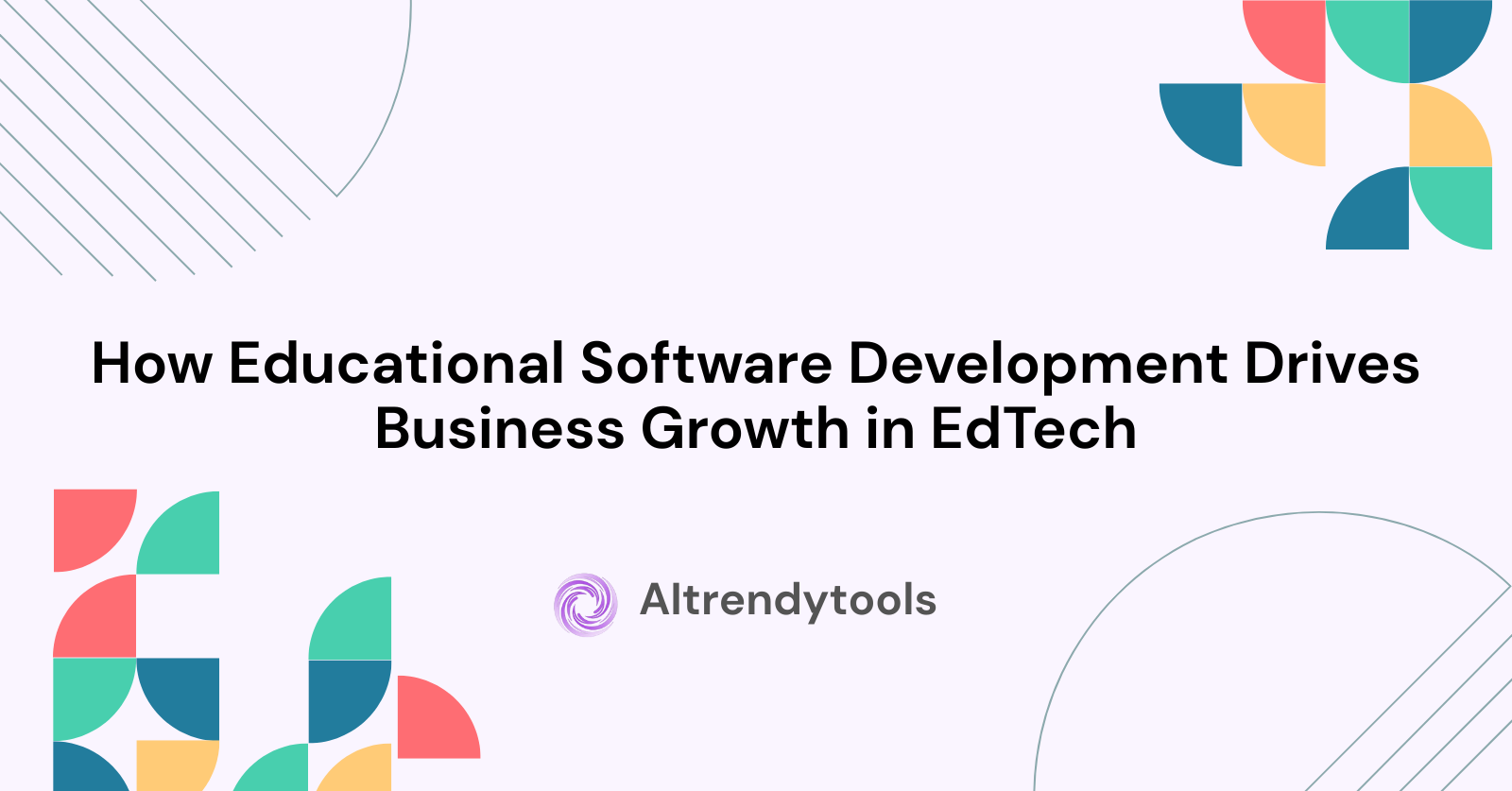🔥 AITrendytools: The Fastest-Growing AI Platform |
Write for us
Over the past decade, education technology or EdTech has developed from a concept to a leading global industry touted to be one of the fastest growing industries in technology. The pandemic sped up digital adoption in schools and universities, but the momentum is showing no signs of slowing down. Today, EdTech is more than just about digitising classrooms, and is centred around building viable business models around the way people learn, train, and grow. In the middle of this change is the role of developing education software, work that marries pedagogy with technology in order to create scalable software products that scale across markets and achieve measurable results.
To entrepreneurs, investors and companies, the development of educational software represents more than a technical process. It’s a growth driver that opens up new revenue channels, gains market share, and builds loyalty in a competitive global marketplace.
Educational Software and Its Growing Use in Business
The reality in the past is that educational software was mostly made for the schools, the way that is external to one’s control like textbooks for instance in digital form or even sometimes simple lean management systems. Today, however, it’s beyond the classroom, too. EdTech solutions are increasingly being used by businesses, governments and NGOs for corporate training, compliance training, retailers for educating consumers, banks for educating customers and professional development.
This growth reflects an underlying truth: knowledge has become a strategic asset. Players who can reskill their own workforce or offer learning platforms online to their customers have a competitive advantage. The opportunity for EdTech companies here is evident: if they can build software that meets both the needs of an academic environment and the real world of business, they stand to tap into two markets at once, leading to exponential growth.
How an Educational software development company is key to business expansion and an EdTech software company is what businesses within the education industry need to help to ensure they thrive in the fast-moving technology business. These businesses created platforms to increase access, personalize learning, and gather immediate data on how individual learners were progressing. Startups benefit from bespoke solutions for competitive differentiation, and established businesses can leverage scalable platforms to increase their market penetration and increase revenue.
Why Educational Software Development Is a Growth Driver
There are a number of reasons for why bringing your ideas of educational software development to life has now become a direct access route to success:
Scalability of digital platforms
Software once written can be copied and distributed worldwide at low marginal cost. This kind of scalability can be particularly potent in EdTech, where platforms can serve up content to millions of learners at once.
Recurring revenue models
Education software as a service enables companies to create predictable, recurring revenue. Learning management systems, online tutoring platforms and digital course marketplaces are built on this model.
Data-driven insights
Contemporary educational software tracks a large amount of data about learners, including how engaged they are in a course, and what proportion of the knowledge they retain. This data can be monetized through better product design, personalized experiences and business intelligence about the workforce or the end customer.
Integration with broader ecosystems
Learning platforms commonly integrate with business applications like HR systems or project software or have connections to CRM platforms. This mixing makes the product stickier which also keeps the customer from churning.
Global demand for lifelong learning
By 2025,education is no longer limited to what we receive in the formal school-age years. Continuing education and lifelong learning, micro-credentials, professional upskilling, they’re all cultural givens now, driving the demand for software to support it.
From Features to Impact: What Makes Educational Software Useful
For EdTech companies, it’s not enough to develop software, but to build products that truly answer real users' problems and generate long-term value. Some of the important features are as follows:
- AI-driven personalization – Students demand content customized to their rate and style. Moreover, the reference to AI-based adaptive learning modules is gaining momentum in approaches that are directed at a student as well as a professional audience.
- Gamification for engagement – Badges, leaderboards, and progress, which turn learning into a game, as well as facilitate higher levels of retention and learner satisfaction.
- Mobile first, Offline first – Mobile is becoming a primary medium for learning around the world, and the platform must be mobile-optimized and able to be used offline.
- Analytics and reporting – For businesses, it is important to measure learning impact. "Platforms that can connect training to improvements in performance return a better ROI."
- Connected integrations – APIs that integrate learning platforms with HR software and services, content libraries, and collaboration tools position education software as a critical part of an organisation’s ecosystem.
These features play a role in not only improved learning, but also more robust business growth. The platform that keeps users engaged, provides measurable results, and integrates into the workflow as easily as possible is far more likely to scale in a profitable way.
Case Studies: When Software Boosts Growth in Schools
For an indication of the world as it gets affected, try these:
- Corporate training platforms: A mid-size business purchased custom learning software to train its employees in cybersecurity. This not only minimises potential compliance breach, but places the business as a progressive employer, increasing retention and cutting recruitment costs. The software provider, in exchange, gets a long-term contract and recurring revenue.
- Language learning apps: The world knows that gamified learning models can attract millions of users and generate revenue across premium subscriptions, advertising, and institutional partnerships — just take a look at Duolingo or Babbel. Their success illustrates how educational software can become a mass consumer product.
- University partnerships: An EdTech startup develops a digital credentialing platform in conjunction with universities. And as more institutions implement the solution, the company scales globally, benefitting from network effects that contribute to exponential growth over time.
- What all these case studies have in common is that educational software is not just about creating content – it’s about creating business models that reward both providers and customers.
Challenges Businesses Face in Educational Software Development
- A lot of investment to develop: It is orders of magnitude costlier to build scalable, secure and feature-packed platforms, the vast majority of which is frequently over the budget of most smaller startups.
- Barriers to user adoption: A new platform will not be adopted if learners perceive it as difficult to use or not relevant to their individual learning needs. Experience design should be intuitive and human-centric.
- Competition and saturation: The EdTech market is saturated — with thousands of apps and platforms competing for educators’ attention. Differentiating via special features or niche targeting is a must.
- Regulatory compliance: As educational software is frequently collecting vulnerable personal information, it is critical to meet privacy regulations (GDPR, FERPA).
- Ever-changing innovation: Technology and pedagogical practice move fast, so companies will need to regularly update products to keep them current.
What's Next for Business Growth in EdTech
In the future, education software development will help businesses to grow in the following ways:
- AI-driven learning ecosystems – In furtherance to personalization, AI will also be employed to forecast skill gaps and suggest courses on its own, thus establishing platforms as the go-to for enterprises driving employee development.
- AR/VR immersive learning – Virtual classrooms and AR training modules will take engagement to another level, particularly in industries like healthcare, engineering and technical training.
- Microlearning and chunked content – Quick, small learning experiences will be more common, suiting the schedules of today's workforce and increasing learner retention.
- Cloud infrastructure for global scalability - EdTech companies can go global more quickly than ever before because of the capacity to serve multiple foreign markets with localized products.
- Stronger ties between education and work – Platforms that bring together what is learned and what is done will drive both learner and employer adoption and growth.
These are not just trends; they reflect a basic fact that educational software isn’t simply about transforming learning to digital – it’s about transforming how learning fuels economic and personal growth in a digital-first world.
Conclusion
In 2025, the viability of an EdTech company is linked to its software strategy. Educational software is no longer merely a means to deliver online courses, but it is becoming a platform to generate recurring revenue, scale globally, and develop ecosystems in which students, educators and businesses all win.
This is what differentiates companies that will succeed: that understand the need to invest in creating educational software as a long-term strategy, rather than as specialist one-off development activity for projects. If they blend technical excellence with human-centered design, they now can design the platforms that draw and excite learners, as well as please businesses and unlock new revenue channels.
In the end, building educational software is not only about developing apps or systems, it is about driving growth, revamping industries, and reimagining the very concept of education. And for EdTech businesses, it’s the supercharger! It’s what drives the transformation from a vision, to a real impact.
🚀 Submit Your Tool to Our Comprehensive AI Tools Directory
Get your AI tool featured on our complete directory at AITrendytools and reach thousands of potential users. Select the plan that best fits your needs.





Join 30,000+ Co-Founders
Publisher
aitrendytools
Publisher
aitrendytools
Category
blogPlan
FreeRelated Tools
Aitrendytools
Discover critical AI trends for 2026 that SaaS companies must watch. Learn about agentic AI, predictive analytics, and data-driven insights.
Aitrendytools
Discover top AI automation tools for small businesses. Learn how artificial intelligence can streamline operations and boost productivity.
Aitrendytools
Automate pay stubs with payroll AI tools to save time, reduce errors, and ensure compliance. Learn how to set up secure, accurate payroll automation.
Submit Your Tool to Our Comprehensive AI Tools Directory
List your AI tool on AItrendytools and reach a growing audience of AI users and founders. Boost visibility and showcase your innovation in a curated directory of 30,000+ AI apps.





Join 30,000+ Co-Founders

